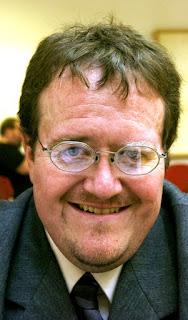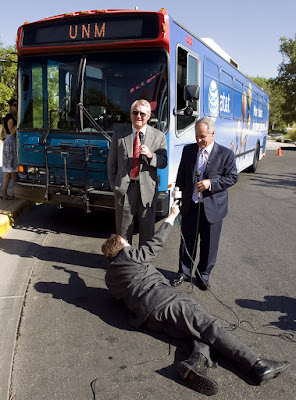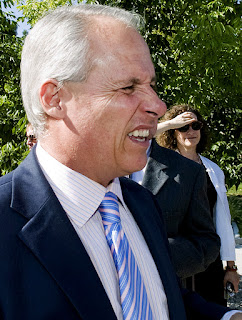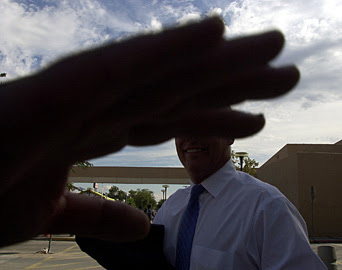 This is Benson Hendrix. He is a friend that I met a few years ago when we took a media management class together. We would also take two other classes, electronic publishing, and copy-editing and makeup.
This is Benson Hendrix. He is a friend that I met a few years ago when we took a media management class together. We would also take two other classes, electronic publishing, and copy-editing and makeup. He was a sports writer for the Journal for 10 years and did an internship as a public relations specialist at the State Engineer’s office. When he graduated, with a bachelor of university studies degree, majoring in public relations and advertising, he went to work for a local public relations firm, D.W. Turner, about a year ago. He recently moved to a new job with the University of New Mexico’s communications and marketing department.
He has been keeping me and the rest of the local media apprised of up-coming events on campus. I was not particularly interested in the new lighting system for Johnson Field. It just didn’t spark my imagination and I knew it would be a long skinny vertical picture, at best. However, last week he told me of a pending press release to announce the cooperation of the university and the city in a project, “Lobo Ride Pass,” where the ABQ Ride busses would provide free transportation for UNM students. State Representative Gail Chasey, a law student, whose district includes the main campus, sponsored the funding of $35,000 through the New Mexico state legislature.
The press conference was his first solo event and he was poring over the details late last week. He was stressed about getting a bus as a prop and making arrangements to have Mayor Martin Chávez, University President David Schmidly, and ABQ Ride Director Greg Payne attend at the same time. After rearranging some schedules, the event was announced for 9:30 a.m. Tues.
I arrived about 9 a.m. and Hendrix was fairly well prepared, but he hadn’t quite figured out where he wanted the dignitaries to stand relative to the bus, so he could provide good visuals for the TV and still cameras.
 His first thought was to have the dignitaries stand next to the parked bus with their backs to the sun. Here he is posing in a “test shot’ to show him why that wasn’t such a good idea. The solution came from his assistant and a fellow current classmate of mine, Katrina Sanchez, who picked a very good spot with the sun coming from a right angle.
His first thought was to have the dignitaries stand next to the parked bus with their backs to the sun. Here he is posing in a “test shot’ to show him why that wasn’t such a good idea. The solution came from his assistant and a fellow current classmate of mine, Katrina Sanchez, who picked a very good spot with the sun coming from a right angle.  There are always things that are considered and sometimes rejected, that as an after thought seem to make so much more sense. The mayor holds one or two press conferences or photo opportunities a day and often provides his own podium. Hendrix had considered supplying a podium, but decided not to because it was going to be such a short event. Then reality hit him. A podium has a secondary, yet important purpose as it holds the microphones for radio and TV stations. It didn’t deter him; he was willing to throw himself in front of the bus and become an impromptu mike stand. Chávez and Schmidly agreed to hold the microphones, encouraging Hendrix not to lie at their feet.
There are always things that are considered and sometimes rejected, that as an after thought seem to make so much more sense. The mayor holds one or two press conferences or photo opportunities a day and often provides his own podium. Hendrix had considered supplying a podium, but decided not to because it was going to be such a short event. Then reality hit him. A podium has a secondary, yet important purpose as it holds the microphones for radio and TV stations. It didn’t deter him; he was willing to throw himself in front of the bus and become an impromptu mike stand. Chávez and Schmidly agreed to hold the microphones, encouraging Hendrix not to lie at their feet.  The other thing he learned was to suggest to his boss, Schmidly, right, not to wear sunglasses during televised statements, because the visual audience wants to see a person’s eyes. It doesn’t matter that they squint; viewers accept it, over not seeing the whites of their eyes.
The other thing he learned was to suggest to his boss, Schmidly, right, not to wear sunglasses during televised statements, because the visual audience wants to see a person’s eyes. It doesn’t matter that they squint; viewers accept it, over not seeing the whites of their eyes. The highlight of the event was to be a ride on the bus around campus with Schmidly pointing out to Chávez various landmarks. Chávez was going to point out where the busses would stop.
So what's wrong with this picture?
 I can’t show you what happened, because after answering questions from a KUNM FM reporter, Chávez passed close by me speaking softly to his police bodyguard, Officer Louie Sanchez. “This guy’s problems…,” Chávez said. He then continued whispering to Sanchez, telling him to keep me from boarding the bus.
I can’t show you what happened, because after answering questions from a KUNM FM reporter, Chávez passed close by me speaking softly to his police bodyguard, Officer Louie Sanchez. “This guy’s problems…,” Chávez said. He then continued whispering to Sanchez, telling him to keep me from boarding the bus. “The mayor says you took a swing at him at an earlier event,” Sanchez, below right, said. “He is afraid of you.” Sanchez asked me, as a personal favor to him, that I not get on the bus. My response to Sanchez was that I was being a journalist and following the story.
 Efforts by Hendrix and the Mayor’s Public Information Officer Deborah James to convince Chávez that I should be allowed on the bus were fruitless. James came back repeating what Sanchez had said. “The mayor is afraid of you.”
Efforts by Hendrix and the Mayor’s Public Information Officer Deborah James to convince Chávez that I should be allowed on the bus were fruitless. James came back repeating what Sanchez had said. “The mayor is afraid of you.”I have never taken a swing at Chávez. The only thing I’ve taken was his picture.
At times, they haven’t been the most flattering. However, that’s my job. I’m not his, or anyone else’s PR Flack. I show him as he is. I have a number of clients and there have been a number of straightforward pictures I have taken of him published.
 Chávez’ image is in constant demand. I don’t play paparazzi with him. I had a hand placed on my lens when photographing him at the 2004 Democratic Presidential Candidates’ debate by an unidentified man who was accompanying him. It was quickly removed when I sternly told the person not to touch the camera.
Chávez’ image is in constant demand. I don’t play paparazzi with him. I had a hand placed on my lens when photographing him at the 2004 Democratic Presidential Candidates’ debate by an unidentified man who was accompanying him. It was quickly removed when I sternly told the person not to touch the camera. Albuquerque Police Chief Ray Schultz did not return a call seeking comment on why one of his officers barred a recognized member of the press from covering a city event and whether a criminal investigation for assault had been initiated against me.
 I have repeatedly asked both James, left, and Schultz to be added to their lists of media contacts to be notified of city and police press conferences or photo opportunities with no results. Both blame underlings for not following their instructions. James, left, blames her assistant Felicia Giron, while Schultz says Public Information Officer John Walsh is not doing what he’s told.
I have repeatedly asked both James, left, and Schultz to be added to their lists of media contacts to be notified of city and police press conferences or photo opportunities with no results. Both blame underlings for not following their instructions. James, left, blames her assistant Felicia Giron, while Schultz says Public Information Officer John Walsh is not doing what he’s told. What does this all mean? This is a case of prior restraint by an elected official trying to punish a person who does not give him the coverage he wishes.
What does this all mean? This is a case of prior restraint by an elected official trying to punish a person who does not give him the coverage he wishes. The mayor is manipulating coverage of his administration. Though some people at the city are free to talk, if the topic gets too close to any sensitive area, workers have been told to refer interviewers to department heads or the PIO, who either don't respond or don't answer the questions. It makes getting information difficult and I have had to revert to seeking details through the state’s inspection of public records requests. Three of the last four requests were not answered in a prompt manner. One was handled routinely and in a timely manner. Another request was delayed, but upon prompting from City Attorney Bob White, I was able to inspect some of the documents held by a department. That request also involved information held by the mayor’s office and there was no response from them. Two other requests are past due the statutory time frames, the first by months, the other by about a week.
White has been trying to coax responses with little success.
2 comments:
Don't you long for the day, when part of the job description of public servants is that they are required to stand and deliver on questions about their public service?
And until the day that they do; are they really public servants?
They say you are known by your friends; also by your enemies apparently.
Keep up the good work.
good job mark
Post a Comment